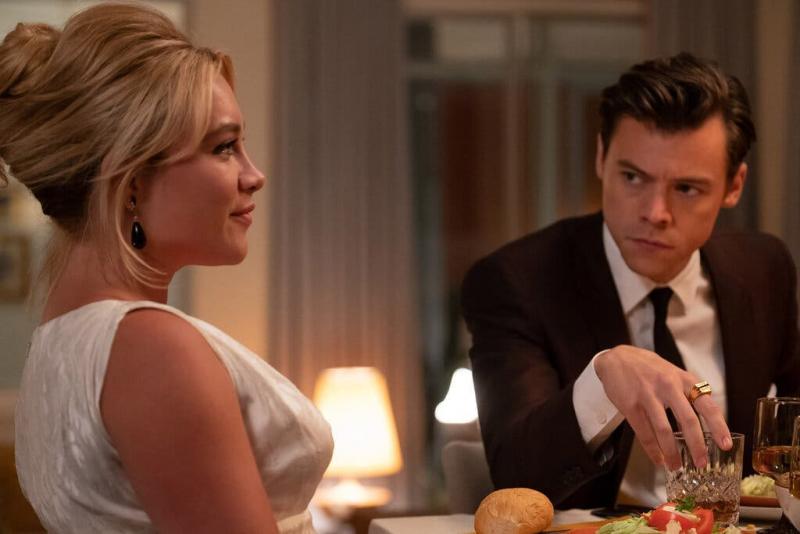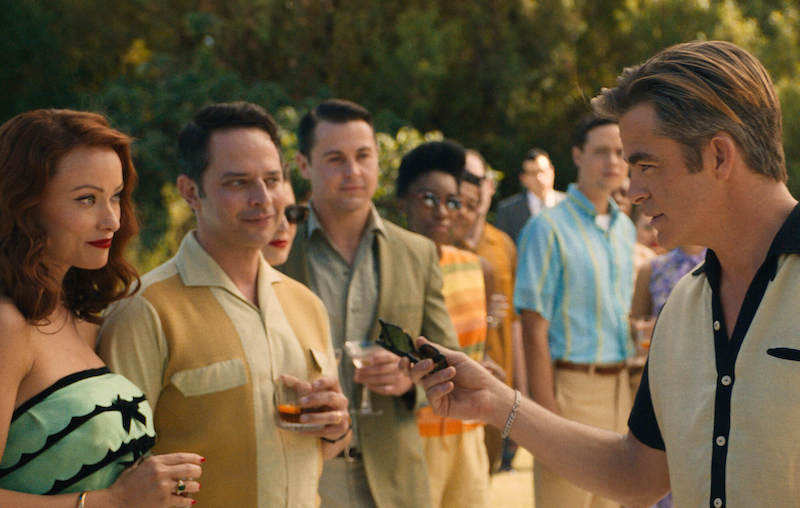Don’t Worry Darling review - dystopian thriller dries up in the desert | reviews, news & interviews
Don’t Worry Darling review - dystopian thriller dries up in the desert
Don’t Worry Darling review - dystopian thriller dries up in the desert
The fabulous Florence Pugh can't rescue Olivia Wilde's disappointing sophomore effort

Olivia Wilde’s follow-up to her exceptional directorial debut Booksmart has been highly anticipated and, of late, accompanied by a torrent of behind-the-scenes bad press and viral virulence. It would be nice to report that the thriller itself transcends all the noise; but, despite yet another exceptional performance by Florence Pugh, it’s a misfiring, undernourished, disappointing affair.
Pugh is Alice Chambers, who with husband Jack (Harry Styles) appears to be living the Fifties dream in Victory, an experimental town in the desert presided over by the guru-like Frank (Chris Pine) and his chilly wife Shelley (Gemma Chan). Amid sun-kissed, palm-treed streets, the inhabitants enjoy gorgeous homes and shiny motors, their lives a whirl of parties and well-heeled ease.
Every morning the husbands drive off in a merry convoy to their top-secret jobs at the Victory Project, leaving their wives to keep house, prepare dinner, drink cocktails by the pool and spend their endless credit in luxury stores.
The women’s price for their comfort: they can’t ask questions of their husbands (all they know of the work is that it’s something to do with “progressive materials”) or leave the “safety” of the town. The repetitive nature of their lives (underlined a little heavily by endless shots of frying breakfasts and housework) is one signal that something isn’t quite right; another is Jack’s unfeasible sexual performance, the stuff of male fantasy that leaves Alice sweeping an entire roast dinner off the dining table in ecstasy; and even though the rampant chauvinism is very Fifties, Frank’s constant reminder of the women’s need for loyalty and sacrifice is decidedly creepy.
The repetitive nature of their lives (underlined a little heavily by endless shots of frying breakfasts and housework) is one signal that something isn’t quite right; another is Jack’s unfeasible sexual performance, the stuff of male fantasy that leaves Alice sweeping an entire roast dinner off the dining table in ecstasy; and even though the rampant chauvinism is very Fifties, Frank’s constant reminder of the women’s need for loyalty and sacrifice is decidedly creepy.
But it’s only when one of her neighbours starts to rebel, and is ostracised as a result, that Alice herself starts to question the reality of this perfect existence. But what has she landed in: a cult, a brainwash, or something even worse?
The obvious antecedent here is The Stepford Wives, Ira Levin’s 1972 novel and its screen adaptations, which mixed satire, feminism and sci-fi horror. While there’s no harm riffing on Stepford, the writers of Don’t Worry Darling fail to add anything new to the pot, politically or dramatically. Who’d have thought they now had MeToo and the heinous incel subculture to draw upon in readdressing their themes? And though the macabre explanation ofthe town’s creation is initially shocking, it’s incredibly poorly developed. It would have been far more interesting had the scenario played more on the real-life, science-led desert community that it deliberately brings to mind, the Manhattan Project; but that inference is no more than a lazy tease.
While Wilde had a wonderfully warm and sassy script to work with in her coming-of-age, female buddy movie debut, here she’s left floundering. The film looks terrific, with a few stand-out horror images, but her storytelling succumbs to the repetitiveness of the Victory routine, and the tension never builds beyond middling.
The actors have the same struggle with the material, including Wilde herself (pictured above, with Pine) as the friend who’s drinking the most Victory Kool-Aid. Styles, at the heart of much of the off-screen distraction, doesn’t redeem his casting, lacking both charisma and danger in the role of a husband whose lack of support for his wife conceals far more than company ambition. I couldn’t help thinking of another actor who played a dodgy husband in a horror scenario, John Cassavetes in Rosemary’s Baby, who possessed exactly the kind of brooding edge that Wilde needed from her leading man.
Pugh has already demonstrated her horror chops in Midsommar and does everything that’s needed of her here, whether presenting a sexy trophy wife, Frank’s feisty adversary, or scream queen; in fact, there is an extraordinary sense of the whole film fading into the background around her. Sadly, that’s of no use to anyone.
The future of Arts Journalism
You can stop theartsdesk.com closing!
We urgently need financing to survive. Our fundraising drive has thus far raised £49,000 but we need to reach £100,000 or we will be forced to close. Please contribute here: https://gofund.me/c3f6033d
And if you can forward this information to anyone who might assist, we’d be grateful.

Subscribe to theartsdesk.com
Thank you for continuing to read our work on theartsdesk.com. For unlimited access to every article in its entirety, including our archive of more than 15,000 pieces, we're asking for £5 per month or £40 per year. We feel it's a very good deal, and hope you do too.
To take a subscription now simply click here.
And if you're looking for that extra gift for a friend or family member, why not treat them to a theartsdesk.com gift subscription?
more Film
 Train Dreams review - one man's odyssey into the American Century
Clint Bentley creates a mini history of cultural change through the life of a logger in Idaho
Train Dreams review - one man's odyssey into the American Century
Clint Bentley creates a mini history of cultural change through the life of a logger in Idaho
 Palestine 36 review - memories of a nation
Director Annemarie Jacir draws timely lessons from a forgotten Arab revolt
Palestine 36 review - memories of a nation
Director Annemarie Jacir draws timely lessons from a forgotten Arab revolt
 Relay review - the method man
Riz Ahmed and Lily James soulfully connect in a sly, lean corporate whistleblowing thriller
Relay review - the method man
Riz Ahmed and Lily James soulfully connect in a sly, lean corporate whistleblowing thriller
 Die My Love review - good lovin' gone bad
A magnetic Jennifer Lawrence dominates Lynne Ramsay's dark psychological drama
Die My Love review - good lovin' gone bad
A magnetic Jennifer Lawrence dominates Lynne Ramsay's dark psychological drama
 Bugonia review - Yorgos Lanthimos on aliens, bees and conspiracy theories
Emma Stone and Jesse Plemons excel in a marvellously deranged black comedy
Bugonia review - Yorgos Lanthimos on aliens, bees and conspiracy theories
Emma Stone and Jesse Plemons excel in a marvellously deranged black comedy
 theartsdesk Q&A: director Kelly Reichardt on 'The Mastermind' and reliving the 1970s
The independent filmmaker discusses her intimate heist movie
theartsdesk Q&A: director Kelly Reichardt on 'The Mastermind' and reliving the 1970s
The independent filmmaker discusses her intimate heist movie
 Blu-ray: Wendy and Lucy
Down-and-out in rural Oregon: Kelly Reichardt's third feature packs a huge punch
Blu-ray: Wendy and Lucy
Down-and-out in rural Oregon: Kelly Reichardt's third feature packs a huge punch
 The Mastermind review - another slim but nourishing slice of Americana from Kelly Reichardt
Josh O'Connor is perfect casting as a cocky middle-class American adrift in the 1970s
The Mastermind review - another slim but nourishing slice of Americana from Kelly Reichardt
Josh O'Connor is perfect casting as a cocky middle-class American adrift in the 1970s
 Springsteen: Deliver Me From Nowhere review - the story of the Boss who isn't boss of his own head
A brooding trip on the Bruce Springsteen highway of hard knocks
Springsteen: Deliver Me From Nowhere review - the story of the Boss who isn't boss of his own head
A brooding trip on the Bruce Springsteen highway of hard knocks
 The Perfect Neighbor, Netflix review - Florida found-footage documentary is a harrowing watch
Sundance winner chronicles a death that should have been prevented
The Perfect Neighbor, Netflix review - Florida found-footage documentary is a harrowing watch
Sundance winner chronicles a death that should have been prevented
 Blu-ray: Le Quai des Brumes
Love twinkles in the gloom of Marcel Carné’s fogbound French poetic realist classic
Blu-ray: Le Quai des Brumes
Love twinkles in the gloom of Marcel Carné’s fogbound French poetic realist classic
 Frankenstein review - the Prometheus of the charnel house
Guillermo del Toro is fitfully inspired, but often lost in long-held ambitions
Frankenstein review - the Prometheus of the charnel house
Guillermo del Toro is fitfully inspired, but often lost in long-held ambitions

Add comment